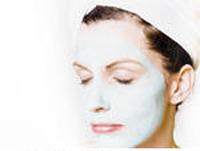|
Help your skin be fine
Skin has pigmentation, provided by melanocytes, which absorbs some of the potentially dangerous radiation in sunlight. It also contains DNA repair enzymes which reverse UV damage, and people who lack the genes for these enzymes suffer high rates of skin cancer. One form predominantly produced by UV light, malignant melanoma, is particularly invasive, causing it to spread quickly, and can often be deadly. Human skin pigmentation varies among populations in a striking manner. This has sometimes led to the classification of people on the basis of skin color. See the article on human skin color. Mammalian skin often contains hairs, which in sufficient density is called fur. The hair mainly serves to augment the insulation the skin provides, but can also serve as a secondary sexual characteristic or as camouflage. On some animals the skin is very hard and thick, and can be processed to create leather. Reptiles and fish have hard protective scales on their skin for protection, and birds have hard feathers, all made of tough β-keratins. Amphibian skin is not a strong barrier to passage of chemicals. A frog sitting in an anesthetic solution will quickly go to sleep. The dermis can be split into the papillary and reticular layers. The papillary layer is outermost and extends into the dermis to supply it with vessels. It is composed of loosely arranged fibres. Papillary ridges make up the lines of the hands. The reticular layer is more dense and is continuous with the hypodermis. It contains the bulk of the structures (such as sweat glands). The reticular layer is composed of irregularly arranged fibres and resists stretching. The hypodermis is not part of the skin, and lies below the dermis. Its purpose is to attach the skin to underlying bone and muscle as well as supplying it with blood vessels and nerves. It consists of loose connective tissue and elastin. The main cell types are fibroblasts, macrophages and adipocytes (the hypodermis contains 50% of body fat). Fat serves as padding and insulation for the body. The skin must be regularly cleaned. Unless enough care is taken it will become cracked or inflamed. Unclean skin favors the development of pathogenic organisms. Functions of the skin are disturbed when it is dirty and it becomes more easily damaged. The release of antibacterial compounds decreases. Dirty skin is more prone to develop infections. Cosmetics should be used carefully because these may cause allergic reactions. Each season requires suitable clothing in order to facilitate the evaporation of the sweat. Sunlight, water and air play an important role in keeping the skin healthy. In fact, skin care and protection should be an essential part of your health, fitness, and beauty regime. If you take care of your skin, your skin will take care of you! If your stuck in a skin care rut, or if you are just looking to learn a bit more about the basics of skin care, read on to learn more about this important step in your daily activities. You are never too young or too old to start taking care of your skin. In fact, skin care and protection should be an essential part of your health, fitness, and beauty regime. If you take care of your skin, your skin will take care of you! But with all of the lotions, creams, and potions on the market, it can be difficult to know which product will work for you. Many products claim to remove wrinkles or heal dry skin. Others claim to contain expensive ingredients that they say will improve the effects of the product. The most important way to care for your skin is to protect it from the damaging rays of the sun. Ultraviolet radiation damages the skin and can lead to wrinkles, premature aging, age spots, and cancer. Take extra precautions to make sure your skin is not exposed to the sun's rays. Use a natural sunscreen, or a moisturizer that contains sunscreen (at least SPF 15) everyday. Your skin does need some sunlight 10-15 minutes of direct exposure daily. When you do use soap, try using a natural very mild soap that does not contain any dyes, parabens or perfumes. Follow up the bath with a moisturizing lotion, concentrating on problem dry areas. A good all natural moisturizer is one of the foundations for a healthy skin care regimen. Continue moisturizing throughout the day to keep skin healthy. Your hands and face are particularly susceptible to daily damage, and may need to be moisturized several times. Wash your skin thoroughly on a daily basis to remove the dirt, debris, pollutants, and perspiration that accumulates on a daily basis. If you have dry or sensitive skin, use only warm water to wash your skin and use a mild natural cleanser every few days. If you have normal or oily skin, be sure to wash with a gentle cleanser on a daily basis. Be sure to brush your teeth before washing your face, as toothpaste residue can irritate sensitive facial skin. Unless your skin is very oily, you will want to use a moisturizer everyday to keep your skin hydrated and healthy. Your skin needs moisturizer all year long as both the indoor winter heat, and summer sun can be equally damaging to your skin. Why is it that practically everyone in the middle class to the upper levels of demographics in any country are worried about getting wrinkles? Maybe it is the fear of getting old or looking old, or the wanting to look socially acceptable, or just plain vanity. We all have our own reasons. But whatever it is, everyone is united in wanting to solve this age old problem. However, in the first place, do we even have any idea about what actually causes these dreaded wrinkles? It's highly probable that we don't. The most important factor in finding a solution to any problem is finding out the root cause of it. As we age, our body undergoes various changes, and so does our skin. In our skin, we have tissues known as collagen and elastin. These tissues are mainly responsible for making our skin firm and stretchable. As we grow older, the amount of collagen and elastin in our skin naturally diminishes. As a result, our skin becomes less elastic and weaker, thus creating "wrinkles". Over the years, beauty experts and skin doctors have come up with a vast array products to treat and minimize wrinkles. Anti-wrinkle creams and ointments help reduce the appearance of wrinkles and prevent new ones from forming. These wrinkle ointments and anti-aging creams help a lot in restoring the skin's firmness and elasticity. In addition, these products contain anti-oxidants and retinol that not only aids in reducing wrinkles and fine lines on the skin, but also stimulates collagen production. The important thing to remember when seeking out treatment for your wrinkles is to know first how your body can possibly react to the treatment. Get in touch with a skin doctor for things that you are not sure of, but are contemplating on trying out. While it is true that physical beauty is just skin deep, it is still no reason why people, particularly women, should disregard basic skin care. Since the skin is our outermost layer, it is exposed to the harsh elements of the environment. And because it is not uncommon for people to base judgments from our cover, with the face being the first thing they look at, it is only proper that we go to great lengths to keep our skin looking clean and fresh.
Definitions and terms on this pageEpidermis Hypodermis Pimples Ultraviolet radiation A love stories starts!
|

